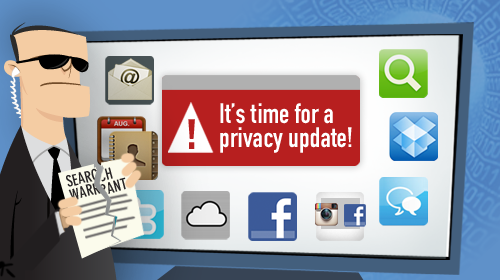
At a time when Americans seem to be increasingly polarized on almost every conceivable issue, a recent study found one issue the vast majority can agree on: Our electronic privacy laws are out of date.
A poll released yesterday surveyed some of the most politically diverse areas in the country — including Nevada, Arkansas, Georgia, New Hampshire, Virginia, and Southern California — and found that over 84 percent of people supported an update to the Electronic Communications Privacy Act (ECPA), the federal law which protects email and other online communications from government snooping.
While ECPA was meant to put in place strong privacy protections when it was passed in 1986, the law has not kept pace with our advancing technologies and now contains a massive loophole that allows emails older than 180 days to be accessed by law enforcement without a warrant. In an age of cloud computing, this means law enforcement quite literally has access to an intimate repository of our lives — including our mistakes — stretching back years and years.
In a truly rare consensus, the poll found the demand for an update for ECPA was consistent regardless of gender, age, race, or party affiliation:
For instance, in Virginia, where 87% of all voters support updating ECPA, is supported by 88% of men and 86% of women, 84% of those under 30 and 85% of those over 65, 85% of African-American voters, 87% of white voters, 84% of Democrats, 87% of Republicans and 90% of independents.
The poll was commissioned by the Digital 4th coalition, a group of advocates that also spans the political spectrum, including the ACLU, Center for Democracy and Technology, Americans for Tax Reform, and the Heritage Foundation. They might make for some of the "strangest of bedfellows" in Washington, but these groups have been able to find common ground on this issue.
Privacy, not surprisingly, is a core American value almost everyone can agree on.
Fortunately there is currently a bipartisan bill in Congress to close this loophole: Reps. Yoder (R-Kan.) and Polis' (D-Colo.) Email Privacy Act. Not only does the bill enjoy huge bipartisan support, it's only a few cosponsors away from having half of the House of Representative signed on as cosponsors.
There is opposition, however, to this commonsense bill.
It is currently being stalled by unelected bureaucrats in a couple of civil agencies, but if we can get the majority of members to add their support we have a good chance of making sure the same privacy protections that apply to our mail apply to our email.
Learn more about ECPA and other civil liberty issues: Sign up for breaking news alerts, follow us on Twitter, and like us on Facebook.
Stay informed
Sign up to be the first to hear about how to take action.
By completing this form, I agree to receive occasional emails per the terms of the ACLU's privacy statement.
By completing this form, I agree to receive occasional emails per the terms of the ACLU's privacy statement.


